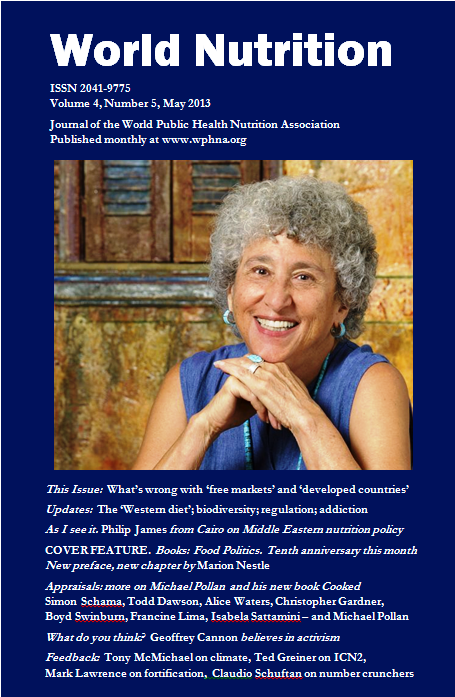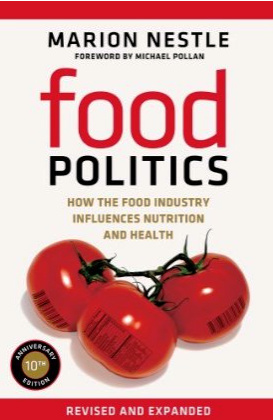Michael Pollan’s Cooked comes out April 23 but the New York Times jumped the gun and reviewed it yesterday. I can’t wait for the copy I ordered to arrive so I can read it for myself.

Whenever the book comes, this seems like a good time to post Geoffrey Cannon’s interviews with some of Pollan’s academic foodie fans (including me) about how we assess his work. These appraisals are now posted in World Nutrition, the online journal of the World Public Health Nutrition Association.

Geoffrey Cannon: When did you come across Michael Pollan?
I had been reading Michael Pollan’s articles in the New York Times Magazine with admiration, to say the least, so when he invited me to participate in a food conference he was running at Berkeley in the fall of 2002, soon after he arrived to teach there, I was looking forward to meeting him. The conference was splendid. It brought together a huge number of journalists, academics, filmmakers, and government and industry officials. The speakers were glittery. Alice Waters did the catering. The side trips were to a farm in Bolinas and an olive orchard in Sonoma run by the owners of the San Francisco Chronicle (they had sketches by Wayne Thibaud tacked to the bathroom walls). Sometime after that, I spoke in one of his classes. But the first meeting I remember in detail must have been in about 2004. I asked for his advice about the book I was working on at the time, which later became What to Eat.
What impressed you at that time?
We met for lunch at Chez Panisse, where he was clearly a regular (I was still having trouble getting a reservation). I wanted his advice about how to write for a general audience. He said he wasn’t the right person to ask, because he didn’t write as an expert. His starting point in developing books was from lack of expertise. As he learned, he brought readers along with him. This turned out to be hugely helpful.
I got to know him better in the spring of 2006 when I taught at Berkeley in a complicated arrangement between three schools. I was paid by public policy, had an office in public health, but journalism – meaning Michael – ran the life support. The following spring I went back to Berkeley to teach a course in science journalism in his program. We did some speaking gigs together.
Rate his work and impact
Obviously, I think he is terrific but I have to do full disclosure. He just wrote the splendid foreword to the tenth anniversary edition of Food Politics. I’ll just say this: lots of people in the US have been working on the food movement for decades, but his work reaches so large and so passionate an audience that he has to be given much of the credit for its expansion.
Quote one of his sayings that stays with you
In What to Eat, I said dietary principles were simple: eat less, move more, eat plenty of fruits and vegetables, don’t eat too much junk food. Pollan says: Eat food. Mostly plants. Not too much. Oh to be able to write like that.
Give an example of where he has made a difference
Students read his work and want to act. Our NYU programs in food studies are filled with people who read Pollan and want to do something to make the food system healthier and better for the planet.
Has his work changed your thinking and if so, how?
I don’t think I ever understood the importance of meat animals in balanced ecological systems to the extent that I now do. The idea of the omnivore’s dilemma is mind-changing on its own. I like it because it is so inclusive of different ways of eating and enjoying food. And I can’t wait to read Cooked.
Does his work have relevance outside the USA?
People outside the US are going to have to answer this one but of course it does. Food systems are global. How we in America eat affects the food systems of countries everywhere else and, to some extent, vice versa.
In what ways if any do you think he is mistaken?
I’m of the belief that although health very much depends on what you eat, body weight depends on how much you eat no matter where the calories come from (one of the theses of my new book Why Calories Count). We argue about this all the time. Eventually, the science will get to the point where this gets resolved one way or the other. In the meantime, it’s fun to debate.
Reference: Gussow J, Kirschenmann F, Uauy R, Schell O, Nestle M, Popkin B, Cannon G, Monteiro C. The American genius. [Appraisals]. World Nutrition 2013;4:150-170. My answers to Geoffrey Cannon’s questions start on page 161.
Addition, May 1. World Nutrition has published a second set of Appraisals, with some commentary.









